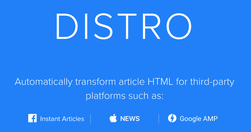Relevant Overviews

publishers are afraid that while the AMP project is nominally open-source, Google is using it to shape how the mobile web works, and in particular, to ensure a steady stream of advertising revenue

Gawker built a tool that pulls in the top 10 comment threads from its network of sites and displays them at the end of its Facebook Instant Articles... [and] Accelerated Mobile Pages... It’s not possible to comment straight on the Instant Article; people who want to add to the discussion have to log in on Gawker’s own sites. Disqus supports Googl…

Distro lets anyone transform an HTML article into the format mandated by one of the various platforms.

Last spring, the Financial Times altered its former metered access model and introduced paid trials, letting users pay £1 ($1.42) for a month’s access to content. At the same time, the newspaper also changed its policies toward social platforms and began making more content free to people coming to its site from Google, Facebook and Twitter. It la…
Enter the new editors of the Internet: giant, centralized tech companies that have created platforms... notably Facebook and Apple — want to be the newsstands of tomorrow: the place we go, inside their own ecosystems, to get our news and information... journalism organizations feel they have no alternative but to be part of those ecosystems. This …
"AMP is not just about news and not just about articles" ... going forward, the focus will be on new creative ad experiences... highly compelling interactive experiences within the format ... this needs to be easy to implement ... seen a lot of organizations with small engineering teams implement this into their homegrown CMSes within a few days…

seen as its answer to the walled garden of Facebook’s Instant Articles... in tests, AMP pages loaded 85 percent faster than regular Web pages... We know faster pages are going to do better in mobile search; why would we not do everything we can do make it faster?”

Axel Springer, wary of being overly dependent on third-party platforms for traffic... fighting back by launching its own news aggregator platform... now has around 1,200 publishers on board ... Digiday spoke with Würtenberger, CEO of Upday, about using humans and algorithms for news sourcing, creating a platform for publishers and banning ad block…
By 2016, most content will be consumed ... on other people’s platforms... Snapchat Discover, Facebook Instant Articles, and Apple News... Google AMP is coming soon, and it will provide an Instant-like experience for not only Google users but also those using Twitter, Pinterest, and other platforms
In this week’s edition, two new social media products in one week; a few good longreads for the weekend; and more stuff for your online toolbox.

The code behind the effort is all available on Github... the fact that it uses an open repository doesn’t mean that Google isn’t running the project, or deciding what gets included and what doesn’t... publishers have another option ... simply take the best parts of the specification from the publicly available documentation and implement those …

"Accelerated Mobile Pages speed up mobile page load times through a new open framework called AMP HTML, which Google says "allows websites to build light-weight web pages." Google says it has nearly 30 publishers signed on to participate in the project, including The New York Times, Vox and Gannett." (What was the point posting each of the 6 ar…

the Google standard gives publishers a streamlined page-loading script they can use that takes advantage of smart caching of content—either on their own servers or on Google’s servers—to make the various elements load faster...an order of magnitude faster than the typical mobile page... a completely open standard that any publisher can implemen…